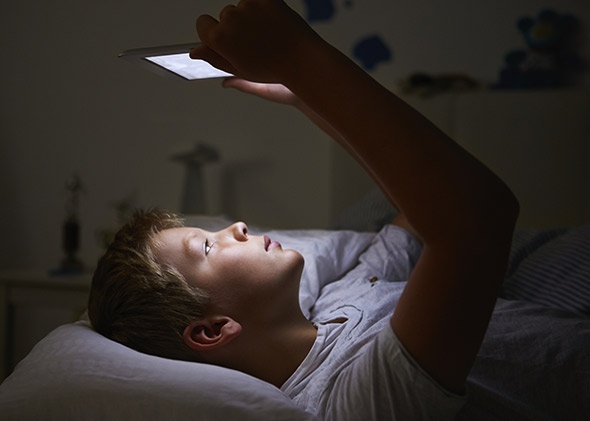Why Are Some People Early Birds and Others Night Owls?

Photo by Thinkstock
Answer by Suzanne Sadedin, Ph.D. in zoology from Monash University:
Your sleep cycle is primarily regulated by circadian clocks that
drive rhythmic fluctuations in hormone levels. Humans have several of
these, but we only really understand the main one, which is in your
hypothalamus, way down near the base of your brain.
Here's how it works. Your eyes contain special photosensitive cells
(in addition to the rods and cones you use for normal vision) that reach
back into your hypothalamus. When light touches your eyes, these cells
alert the hypothalamus, which uses the information to decide whether
it's daytime based on a roughly 24-hour cycle. When your hypothalamus
decides it's nighttime, it tells your pineal gland to secrete melatonin.
And melatonin makes you sleepy.
Artificial lighting at night confuses your hypothalamus. It thinks, Oops, I'm out by a couple of hours.
So it tries to correct by making you sleep longer in the morning.
People also often shut out morning light with curtains, confusing their
hypothalami even more. That night, your hypothalamus sticks to its new
schedule, so you get sleepy later, so you keep the lights on later, and
your hypothalamus decides to shift your cycle even further.
In experiments where people are kept away from natural lighting, they
tend to maintain a circadian rhythm about 20 minutes too long. So it
seems our natural clock isn't that reliable to begin with; we're heavily
dependent on natural lighting to keep it accurate.
By the way, circadian clocks also decrease your heart rate, lower
your core body temperature, and lower your cortisol (stress hormone)
levels each night. In fact, recent research shows that screwing up your
circadian clock disrupts the function of more than 1,000 genes.
It's been suggested that modern sleep patterns are highly unnatural,
resulting from the prevalence of artificial lighting and chronic sleep
deprivation. It's claimed that preindustrial and tribal societies normally sleep in two four-hour shifts,
with a two- to three-hour awakening in the middle. This pattern has
also emerged in people who were experimentally kept away from artificial
lighting.
Lastly, there seems to be a genetic component to whether you're an early bird or a night owl, and brain imaging studies show consistent differences
between these groups. Night owls are more prone to depression, drug
use, and insomnia. On the up side, they're better at reasoning, more
productive, wealthier, and more professionally successful. So if you're a
night owl surrounded by early birds, don't let them bully you into a
cycle that may simply not suit your physiology. Keeping your circadian
rhythm (fairly) stable and getting enough sleep overall are what
matter—not what time you go to bed.
More questions on Quora:
No comments:
Post a Comment
Please leave a comment-- or suggestions, particularly of topics and places you'd like to see covered